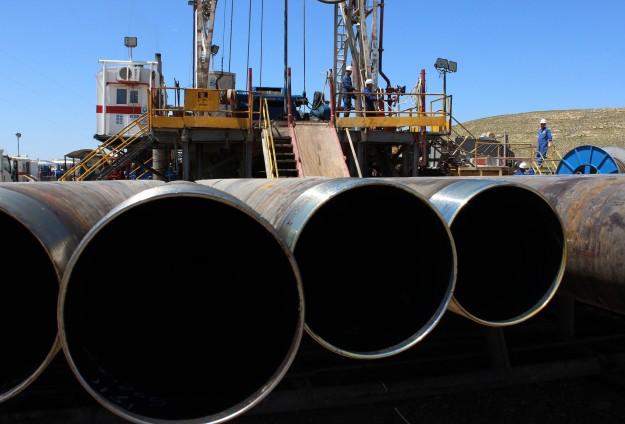
GREECE COULD BE THE HUB

Russian Prime Minister Dmitry Medvedev is due to meet with his Greek counterpart Alexis Tsipras in Moscow on April 9.
The Russian government's press service said the two leaders will discuss "various aspects of trade and economic interaction."
The meeting is part of Tsipras's two-day trip to Russia that has concerned many officials in the EU, which has levied strong economic sanctions against Moscow over its annexation of Crimea and support for separatist forces in eastern Ukraine.
Tsipras -- a former Communist who became prime minister in January -- met with Russian President Vladimir Putin on April 8 for talks focused on economic and investment issues.
Putin said after the talks that Tsipras had not requested financial aid or loans from Moscow and that the two discussed "cooperation in various sectors of the economy" that included "developing major energy projects."
Debt-stricken Greece is battling eurozone and International Monetary Fund creditors to receive the final tranche of a loan under less austere conditions.
Putin said Russia is interested primarily in investing in things such as "ports, airports, and pipelines."
He said Greece's participation in Russia's multibillion-dollar Turkish Stream gas project could help transform the Southern European country into an energy distribution hub for the continent.
Putin said Russia is prepared to work with Greece to build an extension of the Turkish Stream pipeline through the Balkans to Greece and possibly further to Italy.
He added that he is sure Greece can repay the approximately $265 billion in loans extended to Greece by the IMF and eurozone countries.
Putin said Russia could possibly provide Athens credit for large projects such as the Turkish Stream project that could earn Greece "hundreds of millions or euros annually" and help Athens pay back loans to its European and international creditors.
Tsipras said his country was interested in the project but made no public commitment for Greece to participate.
The Turkish Stream pipeline project is Russia's replacement for the South Stream project, which the EU effectively put on hold due to legal issues involving the same company supplying gas and constructing and owning the pipeline transporting the gas.
The Turkish Stream pipeline would run from Russia across the bottom of the Black Sea to Turkey where it would eventually feed some 63 billion cubic meters of gas into Turkey's pipeline network headed towards Europe.
The EU has already criticized Turkish Stream as being the same as South Stream but Russia claims it is selling the gas to Turkey and it is up to Ankara to decide where to ship it after it enters Turkish territory.
Critics of Putin in the West have suggested Russia is using gas supplies as as a geopolitical tool.
Tsipras said, "Greece is a sovereign country with its own unconditional right to pursue a multifaceted foreign policy" that included participation in energy projects.
Sanctions, Countersanctions
Tsipras also called for an end to what he described as the "vicious circle" of sanctions against Russia over the Ukraine crisis.
Putin also mentioned the possibility of joint agricultural projects with Greece but he said Russia could not make an exception for Greece regarding Moscow's ban on food imports from European Union nations.
"It is unfortunate that counter sanctions which have been imposed on the West have affected Greece," Putin said, "but we cannot make any exceptions for any country in the European Union."
Tsipras's visit to Moscow was seen by many in the European Union as a way for Athens to gain extra leverage in talks about repayment of Greece's large debt and also a way for Moscow to erode EU unity for sanctions against Russia.
Putin claimed Russia would not use its contacts with individual EU countries to try to solve Moscow's problems with the EU.
Putin noted a "joint plan for 2015-2016" had been signed by the two countries but he did not provide any details about it.
Tsipras and his government has made no secret of seeking closer ties to Russia.
He travelled to Moscow prior to his election victory to meet with officials and lawmakers.
And Tsipras is expected to visit again next month for commemorations of the World War II victory.
Many Western leaders are staying away from a May 9 military parade in Red Square to show anger at Russia's interference in Ukraine.
Tsipras also said that Greece could be "a bridge between the West and Russia," citing the mainly Orthodox Christian countries' "common roots, common struggle, common faith, and also culture."
rferl.org

